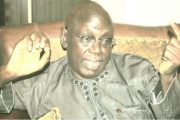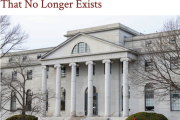Intervention has not read this book yet but Intervention has received the cover page. The assumption here is that a book on The Challenges and Prospects of Nigerian Democracy from Odia Ofeimum must put very contentious positions on the table. In particular, it must demonstrate animus against logocentric tendencies in Nigerian politics.
Combating logocentric thinking and practices is what defines genuine radicalism today after human history has shown conclusively that foundational truths or centres by which others are to be judged are mere constructs, mostly by those who desire to lord it over others, the very practice that is making it impossible for the progress and peace that Enlightenment thinkers thought would come with reason backed by science and facts. The result has been the turning of modernity into unthinkable atrocities such as the world wars, the Holocaust, imperialism and colonialism.
Democracy, the key concept in this book is a particularly vulnerable to logocentric thinking and associated practices. Even The Economist of London which speaks for liberal internationalism has once wondered about the many paradoxes of democracy. It said, inter alia:
“The starting point of modern democracy is the belief that every sane adult is entitled to an equal say in the conduct of public affairs… There is, therefore, something odd in the fact that in most democracies, this voice is heard only once every few years in elections in which voters choose a president or send representatives to an elected parliament and between these elections, for periods of anything up to seven years, it is the presidents and parliamentarians who do all the deciding while the rest of the democracy is expected to stand more or less quietly on one side, either nodding its heads in irrelevant approval or growling in frustrated disagreement. This is part-time democracy”, (December 21st, 1996 )
This is thus a preview, not a review of Odia’s book, a way of asking those who can find the book to find and read it but to also make it the subject of brutal engagement. It is through such engagements that a book acquires its meaning, much, much beyond the intention of the author. In fact, as Deconstructivists argue, the author dies the moment s/he puts the last fullstop. The reader takes over from there, re-interpreting the text with meanings that the author could never have thought of.
Congratulations to Odia, about the earliest Nigerian who took the ‘linguistic turn’ to the strange domain of Political Science many years before it g slowly started happening or about to happen in Nigerian Political Science.




























